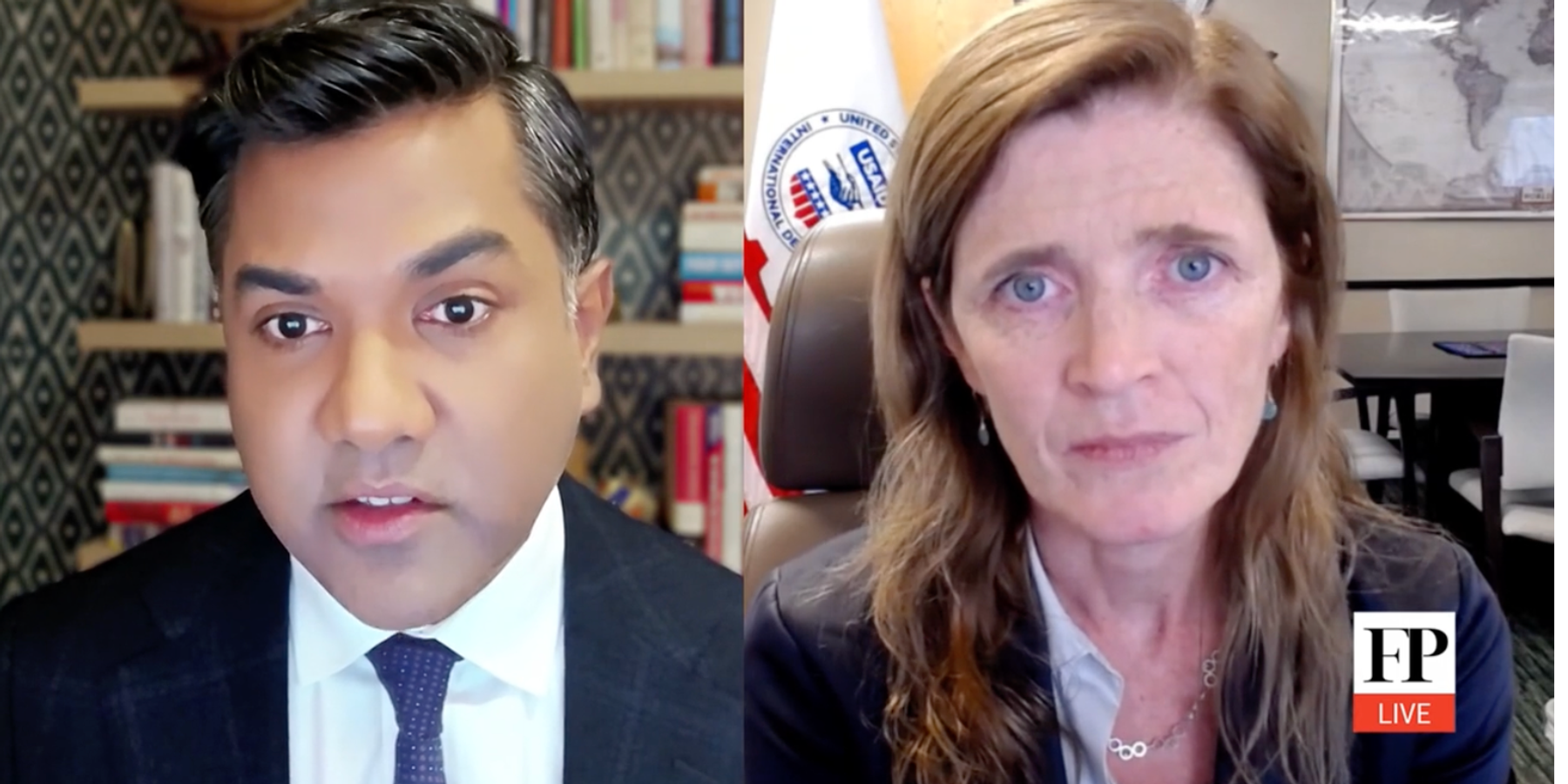In an exit interview hosted by Foreign Policy magazine Thursday, editor-in-chief Ravi Agrawal did not waste time asking USAID Administrator Samantha Power what was really on everyone's minds. He turned first to her 2002 book, "A Problem From Hell: America and the Age of Genocide":
"In a Problem from Hell, the book I just mentioned, which made a strong moral case for using American power to prevent human rights crimes around the world, you wrote, and I quote, 'when innocent life is being taken on such a scale, and the United States has the power to stop the killing at a reasonable risk, it has the duty to act.' You wrote that in 2002 I believe, and you're in a position of power now. So I have to ask, why haven't you done more to stop the ongoing atrocities in Gaza, much of which have been committed with weapons funded by U.S. taxpayers?"
It would be a major surprise if Power hadn't anticipated that question, having made her entire career out of a massive scold of the Washington foreign policy establishment for not sending the military in to stop the genocide on Rwanda in the mid-1990's. She developed an entire doctrine — Responsibility to Protect — that emboldened humanitarian interventionists with the imperative to use American power to intercede in crises and shamed those who did not concur.
Agrawal even called her a "humanitarian superstar" as he nonetheless picked a bit assertively at what many have called the scab of hypocrisy: if not a genocide in Gaza (though the International Court of Justice has said genocide charges were plausible, and Amnesty International and Human Rights Watch have in recent days called it such) or ethnic cleansing (per Doctors Without Borders, former Israeli Defense Minister Moshe Ya’alon), is not the civilian slaughter, the siege of food, water, medicine, the relentless bombing of hospitals, tent encampments, and shelters, "a problem from hell" that deserves the same righteousness?
Here is her reply:
"Well, having the privilege of being at USAID, an agency that is the lead government actually trying to reach Palestinians with assistance, I actually feel really fortunate given the scale of suffering that I'm in a position to be negotiating, things that I know seem small, maybe next to the scale of suffering going on. But that matter, for people who are reached with a food distribution or something as again, what seems as paltry as a tent, but one that you know at this point we only have 22% of shelter commodities actually having reached civilians, even as the temperature drops...
"So that's my focus, Ravi,...I take my responsibility to advocate both within the administration for the policies that I think will best advance the cause of trying to see less civilian pain against the backdrop of this horrific war, but also the operational responsibilities I have to actually negotiate changes that can make a difference. It's really bad."
She said there is "nowhere else I'd rather be" to help make changes. Note, she acknowledges the overwhelming state of the disaster, and even the sheer lack of progress over the last year, but does not say why or lay blame for the dead aid workers (we know who they are) or blocked aid (though she did say it, once, back in May).
Agrawal pushed back:
"So you again, you have all this access to power in the White House, and I'm sure, I imagine, you're pressuring them to apply more leverage on Prime Minister Benjamin Netanyahu. You've met with the prime minister, you've been to Gaza and to Israel. Tell us a little bit behind the scenes. When you push them to focus more, think more about the collateral damage of their actions, what happens and why can't they do more?"
Her curtest response yet: "Ravi, I'm not, that's not what I'm going to do here today. I'm not going to talk about my meetings. That's not what I'm going to do here today."
To which he responded:
"Going to try one last approach... back to your book, you wrote back then, 'my only regret is that I don't work at the State Department, so I can quit to protest policy.' And many people, many U.S. officials have quit over U.S. policy in the Middle East, over the civilians who've died in Gaza and Lebanon. Did you consider quitting, and talk to us a little bit more about the trade-off between being in power and trying to affect change and being outside of power?"
Again this must of been anticipated. The State Department has lost a slew of staff and officials over the last year in protest. Power is not one of them. The short answer: she said her "position of power" is at USAID which has a giant portfolio of crises to contend with outside of Gaza, like Sudan, and countering China's influence (she actually said that), and she believes she is doing something to change the world, somewhere. "In asking the question you asked, which is totally legitimate," Power said, "I am trying to take into account, again, the cost benefit of how much good am I doing, or can I do where I am, versus going to the outside."
When she was confirmed, Biden granted Power a seat the National Security Council meaning she has more influence and power at the policy level than her predecessors. Given her moral and ideological motivations for joining government, which at this point are threaded into Washington lore, it is both sad and immensely disappointing that she is leaving the administration on such a low note of acknowledged failure, and that Gaza was unable to benefit from her legendary activism in this regard. The question Agrawal never really asked was, "why?"
















